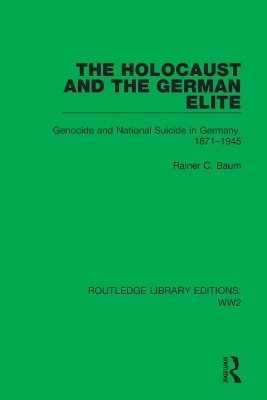
The Holocaust and the German Elite
Genocide and National Suicide in Germany, 1871–1945
Seiten
2023
Routledge (Verlag)
978-1-032-10829-2 (ISBN)
Routledge (Verlag)
978-1-032-10829-2 (ISBN)
This book, first published in 1981, is a study of the social and political sources of amoral political rule in modern times. Only a moral indifference unparalleled in history made the Holocaust possible, and understanding this requires an understanding of the social forces that produced a national amorality among Germany’s elites.
This book, first published in 1981, is a study of the social and political sources of amoral political rule in modern times. Only a moral indifference unparalleled in history made the Holocaust possible, and by linking the German imperial ambitions to the meaningless suffering and death in the concentration camps, the true significance of the Holocaust is revealed in all its horror. Understanding this requires an understanding of the social forces that produced a national amorality among Germany’s elites. The author suggests three contributive causes: a marked ambiguity among Germans in their attitude towards social values; the development of a cadre characterized by status insecurity; and an inability to resolve internal conflict.
This book, first published in 1981, is a study of the social and political sources of amoral political rule in modern times. Only a moral indifference unparalleled in history made the Holocaust possible, and by linking the German imperial ambitions to the meaningless suffering and death in the concentration camps, the true significance of the Holocaust is revealed in all its horror. Understanding this requires an understanding of the social forces that produced a national amorality among Germany’s elites. The author suggests three contributive causes: a marked ambiguity among Germans in their attitude towards social values; the development of a cadre characterized by status insecurity; and an inability to resolve internal conflict.
Rainer C. Baum
1. Introduction 2. Why Moral Indifference? 3. On the Cultural and Social Sources of Moral Indifference in a Nation That Failed 4. Value Dissensus in ‘German’ Society 5. One-Dimensional National Elites: Impressions from the Pages of History 6. State and Society in Wilhelminian Germany: The Birth of Mass Politics 7. Weimar and After: The Politics of Ideological Militancy 8. The Nazi New Order: Institutionalized Disorder 9. Toward a Social Theory of Moral Indifference
| Erscheinungsdatum | 29.03.2023 |
|---|---|
| Reihe/Serie | Routledge Library Editions: WW2 |
| Verlagsort | London |
| Sprache | englisch |
| Maße | 156 x 234 mm |
| Gewicht | 562 g |
| Themenwelt | Geschichte ► Allgemeine Geschichte ► 1918 bis 1945 |
| Geschichte ► Teilgebiete der Geschichte ► Kulturgeschichte | |
| ISBN-10 | 1-032-10829-0 / 1032108290 |
| ISBN-13 | 978-1-032-10829-2 / 9781032108292 |
| Zustand | Neuware |
| Informationen gemäß Produktsicherheitsverordnung (GPSR) | |
| Haben Sie eine Frage zum Produkt? |
Mehr entdecken
aus dem Bereich
aus dem Bereich
ein Psychologe erlebt das Konzentrationslager
Buch | Hardcover (2024)
Kösel (Verlag)
CHF 30,80
Mythos „Stauffenberg-Attentat“ – wie der 20. Juli 1944 verklärt und …
Buch | Hardcover (2024)
Goldmann (Verlag)
CHF 33,55


